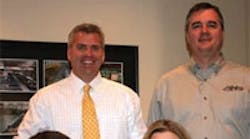Each year, the editors of Material Handling Management solicit names of Mater ial Handl ing Equipment Distributors Association (MHEDA) members who demonstrate exceptional skill in adding value to clients’ businesses. We review the list of candidates and select one company we feel best exemplifies the term “value-added.” This year, we’ve expanded that definition to honor a company that has, through its efforts, added value beyond its clients, into the material handling industry and its surrounding community. This year’s recipient is AHS Incorporated, Cincinnati.
“We encourage all of our team members to look outside of the industry and do other things,” says Chuck Frank, president and CEO, AHS. “It’s an ongoing education. And, it helps us pass on the blessings we’ve received in life because there are a lot of people less privileged.”
AHS was among several distributor companies and individuals that generously donated to MHEDA’s scholarship fund in the past year. The scholarship program, in addition to MHEDA’s recently launched Gateway Project, are cornerstones in attracting talent to our industry.
Gateway will serve as an entry or meeting point for students and industry professionals, as well as academic advisors.
“We have some house rules here at AHS,” says Frank, “because we believe that what we do comes back.” Among those house rules he lists: be moral, be ethical, work with utmost integrity and many others.
Included is reaching out to the community that surrounds this company in north Cincinnati. AHS picks up the entry fees, with the money going to charity, for any team member wishing to participate in local events, such as the Flying Pig Marathon that promotes autism awareness. It also supports participation in national events, such as the Mercy Heart Mini-Marathon, an American Heart Association event. It also supports local charities, such as the Children’s Home, an organization that was established during the Civil War. AHS team members also donate time and money to the Special Olympics.
“These kinds of efforts promote the culture that we are what we are,” says Frank. “And, in these outside endeavors, as well as in our business dealings, there are no gray areas. With us, it’s black or white. We need to be painfully honest with our clients.”
A Different Approach
In discussing his business, Frank interchanges the words “client” and “guest.” It reflects
how he and his management team approach the material handling business. About three years ago, the executive team of the company undertook a major review of how it did business. What made the business successful, and how it could it be done better?
“Our objective has to be, ‘how do we make ourselves better, make our families better, and make those with whom we come into contact better,’” he says. “It’s all about customer service, and that’s about taking care of other people. We’re human beings, and we’re here to service other human beings.”
The program that evolved, and continues to evolve, from those first strategic planning meetings three years ago created four service groups under the AHS umbrella. It involves matching the education and skills of the (currently 46) staff members with the task at hand. “We look to design a path for our people where they can grow and, at the same time, offer the best value to the company,” he says.
Frank says there are various levels of needs among clients. His current corporate structure allows him to take a menu of options out to the client, based on the wants of the client. An engineer or systems integrator is not required for the client that needs a piece of equipment viewed as a commodity. For example, the Material Handling Basics (MHB) service group offers a wide range of products. This is the sales and service area of the company.
At the other end of the spectrum is the company needing full consulting and integration services. For those companies, AHS has its Strategic Design Services and Integration Services offer ings. These are the folks that do the creative design and engineered-solutions projects.
“Consulting work is a tough thing,” says Frank, “because for the guest, there’s nothing to see or touch—and it’s expensive.”
To make this service less painful for both parties, and for getting to the “yes” or “no” part of the deal more quickly, Frank and his team designed a six-step process they call “Forward Motion.” The methodology involves all the steps of a project, from beginning to end.
“The methodology defines what the client can expect from us, and importantly, what we expect from the client,” explains Frank. “The crucial step is number four—executive approval. We need to know, and the client needs to know, before we move on and invest any more of our time and talent, that the project has the financial blessing of the client’s management.”
Another thing AHS does, that varies from many companies, is a thorough ROI analysis that is quantifiable, says Frank. “There’s more to ROI than just money. Of course, that’s important; however, the client also has to ask why it is even doing the project. Where does it hope to go in doing this, and what should be measured? You need to know what the end looks like before you start.”
Measuring Success
While ROI analysis is critical up front and when the project is finished, AHS continues to measure the client’s productivity after the job is finished and running. This process is educational for the client and AHS. Were the right decisions made initially? Were the right things measured? “These kinds of questions, and many more, help us with the next client or if this client wants to expand its services,” says Frank. “You don’t want to be three months into a project and realize there’s a problem. And, if you have to go back, you want to be sure you didn’t underperform previously.”
Investing in organizations and events outside the four walls of AHS helps to keep his team members grounded and humble, says Frank. “And, when we’re working with our clients, every day, we need to communicate with them and exceed their expectations. You have to thank them for being a client. Thank them for doing business with you.”




